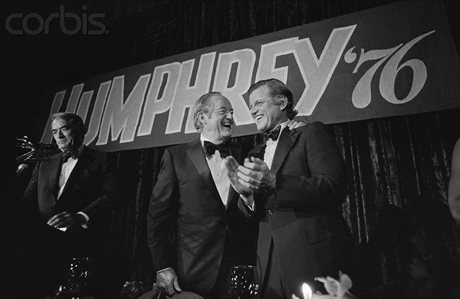In 1988, while working for the late Sen. Ted Kennedy in Minneapolis—he was stumping for Hubert “Skip” Humphrey for the U.S. Senate—a revelation occurred out of the public sphere. As a witness to the event, it resonates today in the era of partisanship. It was an example of how politics really work when not viewed solely through the jaded lens of the media.
After a made-for-TV political rally, the principles of the event went back to former Vice President Walter Mondale’s house for a private party. Mondale had been out of office for eight years had no staff with him. He asked if I could staff him that night. Taken aback that he would “ask,” we had no problem fitting him and his wife Joan into the main entourage. It was truly an honor and a privilege that I was able to staff them that night.
Back at Mondale’s house, Sen. Kennedy’s back was hurting him, so we took him to an upstairs bedroom out of the throng of people on the first floor of the house. Despite the pain, the senator had no intention of leaving. Muriel Humphrey, the former senator and wife of the late Hubert Humphrey, was on her way to the Mondale house.
“I’m not leaving until Muriel arrives,” Kennedy let it be known.
He stayed in that room with the ex-vice president, the ex-second lady and “Skip” Humphrey, and they all waited together for Muriel to arrive. They joked, they laughed and they genuinely liked each other. Gone were the television cameras, reporters, supporters, protesters and assorted clutches that were usually in attendance. In that room were the real people who shared a 28-year history of competition, tragedy and great accomplishment.
A little history: In 1960, Jack Kennedy ran and won the Democratic nomination for president against Skip’s father and Muriel’s husband, Hubert H. Humphrey.
In 1968, Robert Kennedy ran against then Vice President Hubert H. Humphrey for the Democratic nomination for President. Bobby had announced his candidacy in March and President Lyndon Johnson bowed out of the race later that same month, setting the stage for a contest between them. After winning the California primary on June 4, 1968, Bob Kennedy was shot and killed. His death allowed Humphrey to secure the Democratic nomination.
Humphrey lost that presidential race to Richard Nixon in November. Two years later, voters from Minnesota returned their favorite son, Hubert Humphrey, back the U.S. Senate, where he served until his own death in 1978. His wife, Muriel, was appointed to fill the term of her late husband, thus making her a U.S. Senator.
Finally, in 1980, Sen. Ted Kennedy decided to challenge President Jimmy Carter for the Democratic nomination. In doing so, he was also challenging Walter Mondale, Carter’s vice president. Like all good VPs, Mondale’s job in 1980 was to politically attack and excoriate the president’s challenger, Ted Kennedy.
But after all those contests between the Kennedys and the Humphreys and the Mondales, these people who competed bitterly for power were now, in 1988, in the same room, sharing stories and showing genuine affection for each other. They were not enemies, they were truly friends.
Muriel arrived a short time later. Sen. Kennedy, who had once been dispatched to Minnesota to ask her husband to withdraw from the presidential race in 1960, greeted his former, aging Senate colleague with a bear hug. He engulfed her and she returned his embrace.
There were no cameras in the room to record the event. A young advance man was there like a fly on the wall, cognizant of the history of the people in the room. It is a moment I will never forget.
That’s what real politics is about. That’s how human beings should relate with one another after the campaigns are done. There are many people in politics who have become good friends after a race is over. In 1986, Ron Smith ran the Ed Zschau campaign against Sen. Alan Cranston, who I worked for at the time. Since then, Smith and I have travelled together and meet for lunch in San Francisco with other pols almost every week. We still disagree, but we have a lot of fun doing it.
Having once opposed Sandy James in Cupertino, I later ran her reelection campaign.
The point of the story is that politics is not about how many enemies you can amass. It is about elections and the mutual respect of people who are in the arena. Certainly there are people who personally don’t belong in politics, and there will be adversaries. But disagreement is not dislike and hate is never appropriate in a mature democratic society. As San Jose begins the 2014 Mayor’s race, let us always keep that perspective.
On most issues, we all share the same values, we serve the same constituencies and we work to make the world a better place. There are disagreements and political campaigns. There are winners and losers. But “losers” is a relative concept, because the next contest is always right around the corner.
As Sen. Kennedy said after he lost the Democratic nomination for president to Jimmy Carter, “The work goes on, the cause endures, the hope still lives and the dream shall never die.”
Rich Robinson is a political consultant in Silicon Valley.


Clearly this does not happen in San Jose !
> In 1988, while working for the late Sen. Ted Kennedy in Minneapolis—he was stumping for Hubert “Skip” Humphrey for the U.S. Senate . . .
Wow, Rich: TEDDY KENNEDY!!!!
Your debt to society is even larger than any of us realized.
First Teddy Kennedy.
Then High Speed Rail.
Then George Shirakawa!
That’s a LOT of remorse you’re going to have to come up with before St. Peter is even going to crack the door to Purgatory for you.
LOL—obviously we have very different deities.
If yours exists, I’ll be happy to spend my eternity with the Kennedys and the Humphreys.